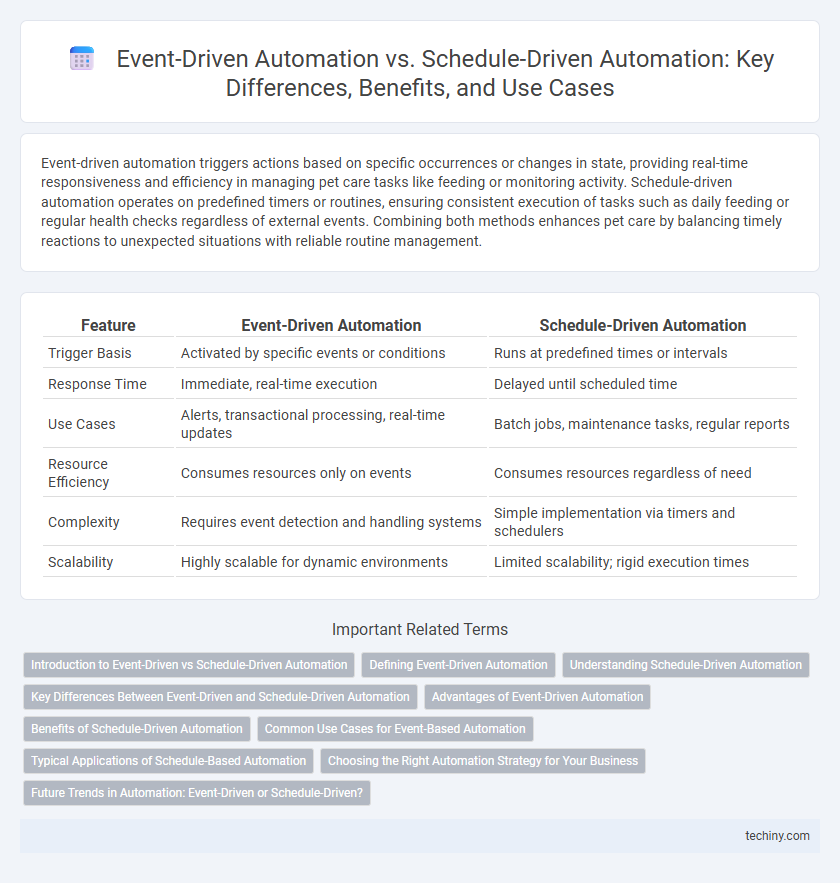Event-driven automation triggers actions based on specific occurrences or changes in state, providing real-time responsiveness and efficiency in managing pet care tasks like feeding or monitoring activity. Schedule-driven automation operates on predefined timers or routines, ensuring consistent execution of tasks such as daily feeding or regular health checks regardless of external events. Combining both methods enhances pet care by balancing timely reactions to unexpected situations with reliable routine management.
Table of Comparison
| Feature | Event-Driven Automation | Schedule-Driven Automation |
|---|---|---|
| Trigger Basis | Activated by specific events or conditions | Runs at predefined times or intervals |
| Response Time | Immediate, real-time execution | Delayed until scheduled time |
| Use Cases | Alerts, transactional processing, real-time updates | Batch jobs, maintenance tasks, regular reports |
| Resource Efficiency | Consumes resources only on events | Consumes resources regardless of need |
| Complexity | Requires event detection and handling systems | Simple implementation via timers and schedulers |
| Scalability | Highly scalable for dynamic environments | Limited scalability; rigid execution times |
Introduction to Event-Driven vs Schedule-Driven Automation
Event-driven automation reacts to specific triggers or events in real-time, enabling immediate responses to dynamic system changes, while schedule-driven automation executes tasks at predefined intervals regardless of system state. Event-driven systems excel in environments that require rapid adaptability and responsiveness, such as monitoring IoT devices or handling financial transactions. Schedule-driven automation is optimal for routine maintenance and batch processing, where timing consistency is critical but real-time responsiveness is less urgent.
Defining Event-Driven Automation
Event-driven automation triggers processes automatically in response to specific events or changes in system states, enabling real-time responsiveness and increased operational efficiency. Unlike schedule-driven automation, which executes tasks at predetermined times regardless of system conditions, event-driven automation relies on event detection through sensors, APIs, or message queues to initiate workflows. This approach is ideal for dynamic environments where actions depend on unpredictable triggers, enhancing agility and reducing resource wastage.
Understanding Schedule-Driven Automation
Schedule-driven automation operates based on predefined time intervals or specific dates, triggering tasks consistently to maintain regular workflows. This method excels in predictable environments where routine processes such as data backups or batch processing require precise timing. Its structured nature simplifies resource allocation and ensures timely execution without relying on external event cues.
Key Differences Between Event-Driven and Schedule-Driven Automation
Event-driven automation triggers actions based on specific events or conditions, enabling real-time responses and dynamic workflows, while schedule-driven automation executes tasks at predetermined times or intervals regardless of external triggers. Event-driven systems enhance flexibility and responsiveness by reacting to data changes or user interactions, whereas schedule-driven systems prioritize consistency and predictability through regular execution cycles. Choosing between these automation types depends on the need for timely adaptability versus routine process execution.
Advantages of Event-Driven Automation
Event-driven automation enhances responsiveness by triggering actions immediately upon specific events, reducing latency compared to schedule-driven systems that operate on fixed intervals. This approach improves resource efficiency by eliminating unnecessary processes during idle times, ultimately optimizing workflow performance. Integration with real-time data sources allows event-driven automation to adapt dynamically, increasing operational agility and precision in complex environments.
Benefits of Schedule-Driven Automation
Schedule-driven automation enhances operational efficiency by executing tasks at predetermined times, ensuring consistent and reliable process management. It reduces the risk of human error by automating routine workflows according to fixed schedules, which improves resource allocation and minimizes downtime. This approach enables better planning and forecasting, supporting businesses in maintaining optimal productivity and meeting compliance requirements.
Common Use Cases for Event-Based Automation
Event-driven automation excels in real-time incident response, dynamic resource allocation, and immediate data processing triggered by specific events such as system alerts or user actions. It is commonly used in IT operations for automated incident management, in finance for fraud detection upon transaction anomalies, and in marketing for personalized user engagement based on behavior triggers. These scenarios benefit from event-driven automation's ability to react instantly to changing conditions, optimizing operational efficiency and responsiveness.
Typical Applications of Schedule-Based Automation
Schedule-driven automation is commonly employed in routine maintenance tasks such as system backups, software updates, and data synchronization, ensuring these processes occur at predetermined intervals without manual intervention. It is essential in environments where predictable, time-based operations guarantee system stability and compliance, such as nightly database replication or weekly report generation. This automation type optimizes resource allocation by triggering workflows during off-peak hours, minimizing disruptions to peak business activities.
Choosing the Right Automation Strategy for Your Business
Event-driven automation triggers processes in real-time based on specific events, offering faster responsiveness and adaptability crucial for dynamic business environments. Schedule-driven automation executes tasks at predetermined intervals, ensuring consistency and predictability ideal for routine operations and batch processing. Selecting the right automation strategy depends on analyzing workflow patterns, business priorities, and the need for flexibility versus stability to maximize efficiency and ROI.
Future Trends in Automation: Event-Driven or Schedule-Driven?
Future trends in automation increasingly favor event-driven automation due to its responsiveness and real-time data processing capabilities, enabling systems to react instantly to specific triggers. Schedule-driven automation remains relevant for routine, predictable tasks but is gradually being enhanced with AI to improve flexibility and efficiency. The integration of edge computing and IoT further accelerates the shift toward event-driven models by facilitating decentralized, immediate decision-making.
Event-Driven Automation vs Schedule-Driven Automation Infographic

 techiny.com
techiny.com